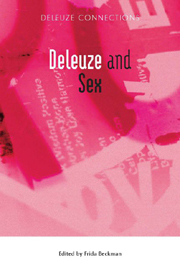Book contents
- Frontmatter
- Contents
- Acknowledgements
- Introduction: What is Sex?: An Introduction to the Sexual Philosophy of Gilles Deleuze
- 1 Alien Sex: Octavia Butler and Deleuze and Guattari's Polysexuality
- 2 Heterotica: The 1000 Tiny Sexes of Anaïs Nin
- 3 Haemosexuality
- 4 Disability, Deleuze and Sex
- 5 Tongue and Trigger: Deleuze's Erotics of the Uncanny
- 6 (Hetero)sexing the Child: Hans, Alice and the Repressive Hypothesis
- 7 The ‘Non-Human Sex’ in Sexuality: ‘What are Your Special Desiring-machines?’
- 8 Deleuze and Selfless Sex: Undoing Kant's Copernican Revolution
- 9 A Preface to Pornotheology: Spinoza, Deleuze and the Sexing of Angels
- 10 Encounters of Ecstasy
- 11 Beyond Sexuality: Of Love, Failure and Revolutions
- Notes on the Contributors
- Index
3 - Haemosexuality
Published online by Cambridge University Press: 12 September 2012
- Frontmatter
- Contents
- Acknowledgements
- Introduction: What is Sex?: An Introduction to the Sexual Philosophy of Gilles Deleuze
- 1 Alien Sex: Octavia Butler and Deleuze and Guattari's Polysexuality
- 2 Heterotica: The 1000 Tiny Sexes of Anaïs Nin
- 3 Haemosexuality
- 4 Disability, Deleuze and Sex
- 5 Tongue and Trigger: Deleuze's Erotics of the Uncanny
- 6 (Hetero)sexing the Child: Hans, Alice and the Repressive Hypothesis
- 7 The ‘Non-Human Sex’ in Sexuality: ‘What are Your Special Desiring-machines?’
- 8 Deleuze and Selfless Sex: Undoing Kant's Copernican Revolution
- 9 A Preface to Pornotheology: Spinoza, Deleuze and the Sexing of Angels
- 10 Encounters of Ecstasy
- 11 Beyond Sexuality: Of Love, Failure and Revolutions
- Notes on the Contributors
- Index
Summary
This chapter proposes becoming-haemosexual as a line of flight from facialised subjectivity and the grid of social relations prescribed for facialised subjects. As Deleuze and Guattari argue, the abstract machine of faciality deterritorialises and stratifies the multidimensional, polyvocal code of the body until a ‘single substance of expression is produced’ (Deleuze and Guattari 1987: 181). Closed up and closed off from one another, positioned in opposition to one another, what passes between facialised bodies, across the void between them, are commodities: products, signs, women. Sometimes the abstract machine of faciality ‘performs a veritable “defacialization,” it frees something like probe heads … that steer flows down lines of positive deterritorialization or creative lines of flight’ (Deleuze and Guattari 1987: 190). In other words, while facialised subjectivity is phallic, it also encloses a rhizome – a multidimensional, polyvocal semiotic that occasionally erupts and disrupts it. ‘Beyond the face lies an altogether different humanity’ (Deleuze and Guattari 1987: 190) which is composed of becoming-woman and, so we will suggest, becoming-haemosexual.
As becomings are immanent processes of transformation rather than fixed states that transcend space and time, many encounters between different bodies in different situations may inspire becoming-haemosexual. The only prerequisite is the presence of blood to a desiring body. In so far as bodies are facialised in the West, blood envelopes an unsettling and potentially liberating polyvocality.
- Type
- Chapter
- Information
- Deleuze and Sex , pp. 69 - 88Publisher: Edinburgh University PressPrint publication year: 2011



